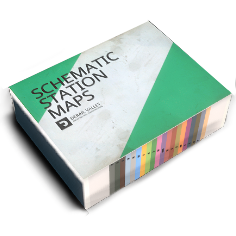Rail Vehicle Types
Types of rail vehicles in Derail Valley can be categorized as:
Car:
Unpowered rail vehicle designed to carry freight or passengers.
Locomotive:
Motorized rail vehicle designed to pull cars.
Railcar:
Car which can self-propel and doesn’t need a locomotive.
Multiple-Unit (by design):
Railcars or locomotives permanently coupled together, with or without cars in-between. These configurations may have rigid connections and are typically inseparable.
Multiple-Unit (by cable):
Railcars or locomotives temporarily coupled together, manually connected by an MU cable.
Train:
Set of coupled rail vehicles.
Control Car:
Cab-featured car at the end of a train, MU-connected to a locomotive elsewhere in the train.
Work Train:
Special-purpose rail vehicle, such as for track maintenance, crew transport, etc.
Related terms:
Cab – Vehicle’s interior space designed to house the driving controls and crew. Some vehicles may be double-cab, meaning they have a cab on each end.
Bogie – Pivoting structure that houses suspension and wheel axles. The body of rail vehicles, mostly cars, is typically situated on two bogies, per unit. Depending on the type of vehicle, bogies may be powered or not, housing two or more axles, and they may come in various shapes and numbers.
Unit – Singular vehicle in a multiple-unit train.
Tender – Unpowered unit behind a steam locomotive used to carry fuel and water.
Booster – Motorized cab-less unit used to provide additional power to the main unit.
Slug – Cab-less unit used to provide additional traction to the main unit with electric transmission.
Draisine – Light work train used for crew transport.
See also: Motorized Vehicle Naming Convention, Multiple-Unit, Work Trains, Vehicle Catalog
